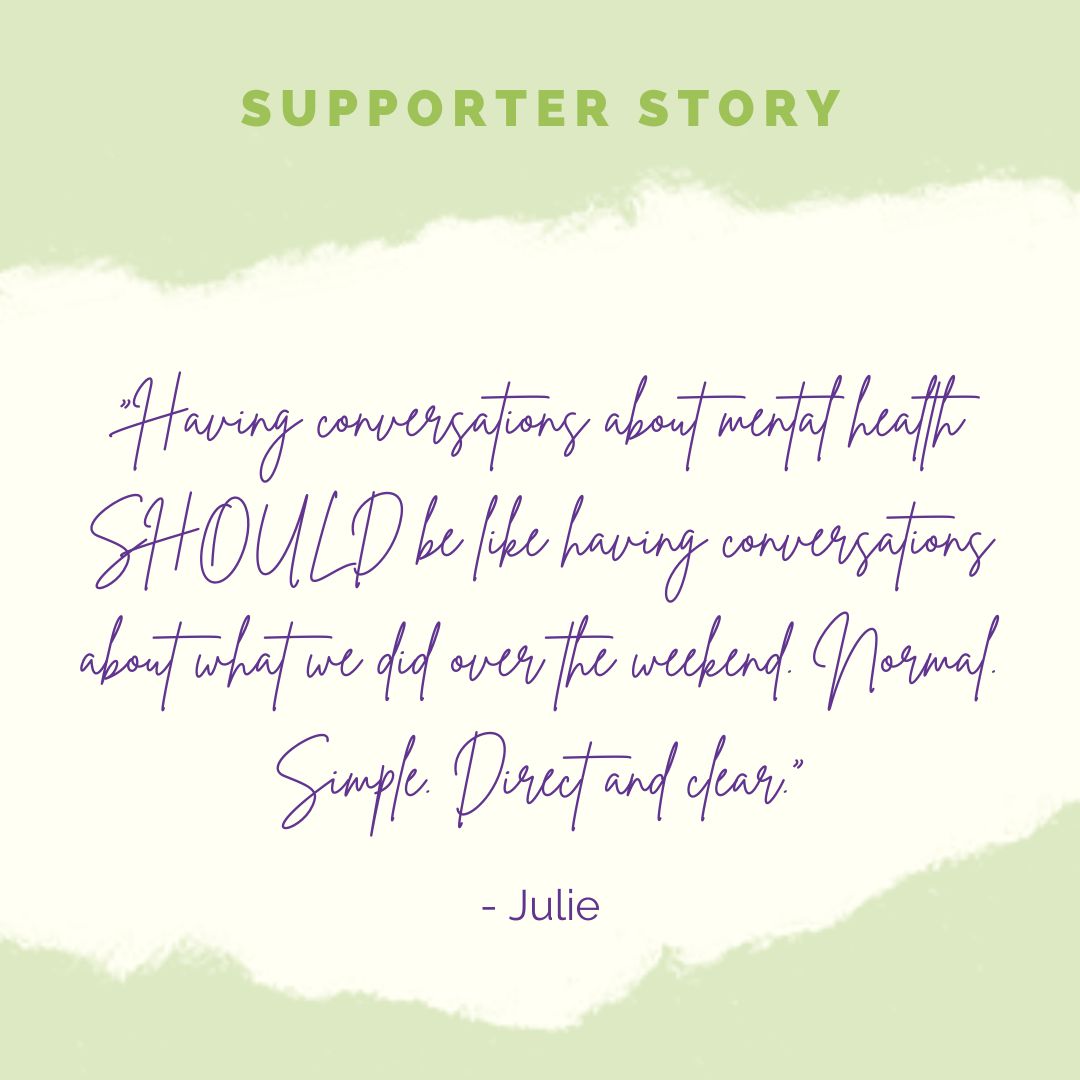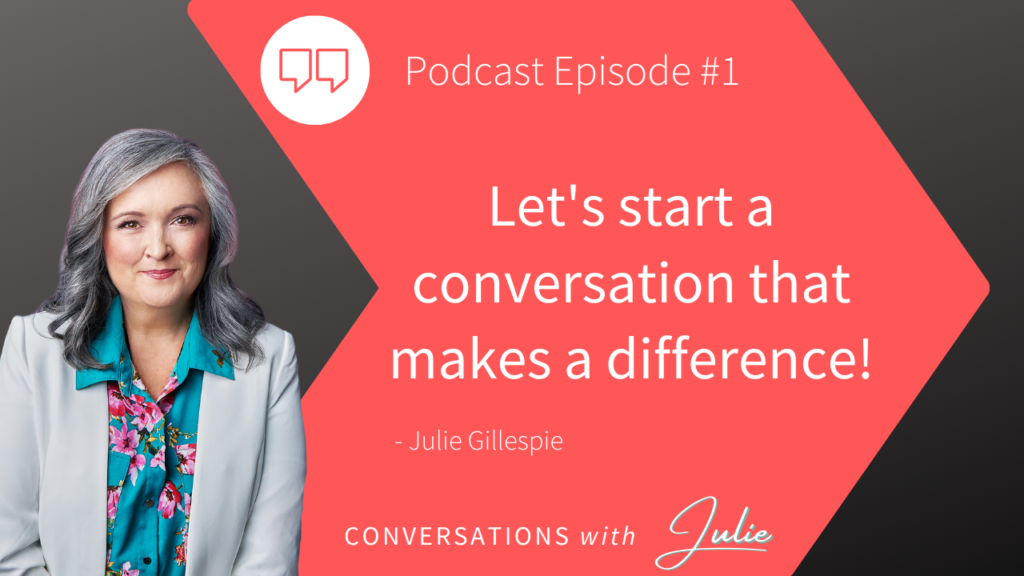News

Julie’s story
Queensland Mental Health Week Supporter
In 2022, we have had some amazing individuals step up to talk about their experiences for Queensland Mental Health Week to confront stigma and support other people’s mental health journeys.
Among these supporters is Julie Gillespie who is a Principal Master Instructor for Mental Health First Aid with lived experience with mental illness.
You can read about Julie’s journey below.
Can you tell us a bit about yourself? Why is mental health so important to you?
I am a woman who has learned to thrive despite her mental illness.
Mental health, to me, for many years was this binary thing… have or not have. And often, I didn’t have it, and sometimes it was broken and shattered on the floor.
Today, mental health is my focus. It is a deeply fascinating topic that no longer defines me AND gives me motivation to support others who may be struggling.
I built my business out of the ashes of my chronic mental illness. After my fourth break-down in 2017 and losing the will to live, I believed that I was unemployable. Fortunately, someone challenged me to defy this belief and I investigated what COULD be done with my experiences and mastered skills that I’d developed over the years.
Discovering Mental Health First Aid in 2018 shone its light of hope on my path. This gave me the framework to help guide others to step in and support someone like myself, to get in early to stop the crash.
From this start, I have researched, explored, and trained to become someone with not only lived experience, but now with lived expertise and I’m excited to thrive ‘in honour’ of my struggles.
What does this year’s Queensland Mental Health Week theme ‘Awareness, Belonging, Connection’ mean to you?
They’re the core of how we can thrive and the purpose behind the video podcast I started this year – Conversations with Julie.
How this theme connects into my understanding: Research shows that stigma can involve three elements: lack of knowledge, negative attitudes, and discriminatory behaviour.
My role as an accredited Principal Master Instructor for MHFA Australia is to raise AWARENESS; to normalise, give a new face to, demystify, and correct misconceptions of what mental health is. I KNOW, this goes a long way towards reducing stigma, but it is a role of advocacy, a softer touch.
Then there is negative attitudes and discriminatory behaviours. When these exist, we cannot feel CONNECTION, we cannot find a place where we BELONG.
I have come to feel that our self-stigma stops us from feeling connection with our self, so we look to belong somewhere, anywhere, and not always the healthiest places.
The Queensland Mental Health Week theme, therefore, is incredibly powerful and is where HEALING starts for many of us. To be Self Aware, to Belong to Self, and to be connected to one’s self I think is the path that many of us are striving to unpack.
(Internal Trust and Safety are topics I covered in Episode #2 of the Conversations with Julie podcast with Emma Schneider)
In terms of WHERE we belong, the external to self, I love the work that Stanford University did on the Belonging Project:
“Individuals develop a sense of belonging when they feel that they are part of a larger community that they believe in – a community that welcomes them, a community that respects and represents their values, and a community that helps them to fulfill their aspirations.”
Why would you encourage people to get involved in Queensland Mental Health Week and have conversations on mental health?
Being able to know you are not alone, that you are not the only one, and that what you are experiencing is really common, HELPS. Because it raises one’s own awareness and lets us see how others have been able to reach for support for their pain.
Having conversations about mental health SHOULD be like having conversations about what we did over the weekend. Normal. Simple. Direct and clear. I think we need to practice these conversations more so it can be simpler and easier – and this is a forum that can promote that and support it.
Have you seen any new mental health initiatives that you’ve been impressed by?
Absolutely! I work with several organisations that are working to do better. This movement is starting within the organisation; in HR and safety departments, and with individuals who may have had a lived experience. It’s not always a management-led initiative.
Let’s take a particular example: Linh Pierson from Wesley Mission Queensland has created an organisation wide, preventative care model, that has nourished a peer support network across 3,000 staff. We did the MHFA training for over 150 staff members as a foundation then introduced skills development programs held regularly throughout the year. Included in the wellbeing package are:
- Instruction guidelines and decision-making trees for managers to care for a staff member who may be experiencing a tough time or is in crisis
- Crisis management protocols for panic attacks and suicidal thoughts and behaviours
- Resource database that contain pragmatic mental health guidelines
- Resource database of appropriate professional support networks
- Opened the program to a Psychology Student thesis to validate the effectiveness of the program
- Is continually developing the portfolio of care based on feedback from the MHFA Officer database
Is there anything else you would like to add?
There is this idea in organisations that someone with a mental illness is ‘someone else’. When I present them with a new ‘face’ to mental illness, and share my story of my journey, there is a new willingness to be open to how common it may be. This is my advocacy role, it’s gentle, it’s slow, but it is working towards reducing stigma.
Tracy Tully, who is an award-winning global speaker, activist, and whistle blower, was a recent guest on the Conversations with Julie podcast (Release 11/08/2022). Through our conversation, I realised that advocacy on its own cannot ELIMINATE stigma. However, when it is combined with ACTIVISM, the combined efforts can change truly happen.
We need more action, using vigorous campaigning to bring about social change, and this can only be done by changing people’s behaviours and organisations’ attitudes towards the idea that someone with a mental health problem is broken. It’s utter B.S.

Stay informed
For all the latest on Queensland Mental Health Week, subscribe to our eNews.
